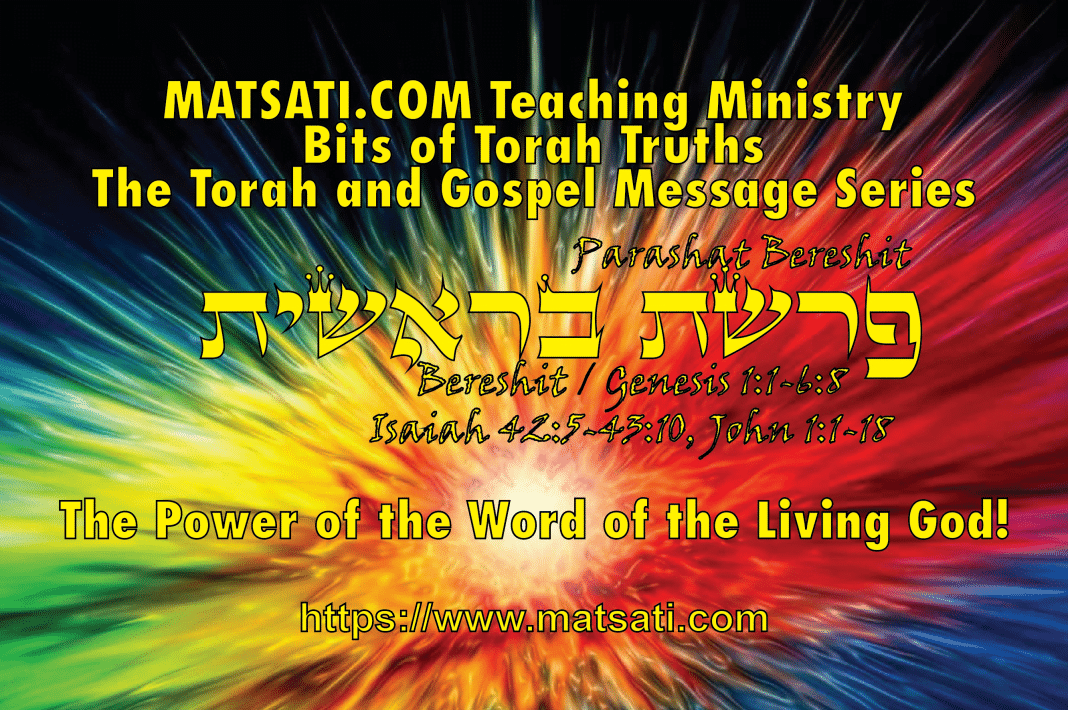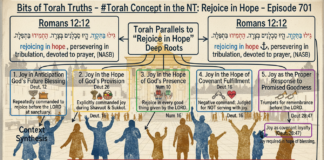The Bible is the Word of the Living God! The Torah, the first five books of the Bible, are awesome from the sense that these are the Word of God, it is profound, and exciting and most importantly it provokes a sense of awe in the power of God. When we see or read something that is exceptional, beyond the ordinary, which speaks to the human experience, and of something greater than we can understand, we get a sense of awe and are able to feel the power of God at work! The beauty of nature is one example, such as the view of the rocky mountains in Colorado, or in Yellow stone park, or the Grand Canyon, these things inspire and reveal to us the power of God in His creation. The Torah is expressed by the Psalmist in the following way.
Tehillim / Psalms 119:96
צו לְכָל תִּכְלָה רָאִיתִי קֵץ רְחָבָה מִצְוָתְךָ מְאֹד:
To all perfection I see a limit, but your commands are boundless.
The psalmists states that the commands of God are exceedingly broad/wide (רְחָבָה) speaking of the greatness and power of God’s Word as expressed in the creation account, according to Bereshit / Genesis 1 and 2. The Psalmist is able to see the perfection and limits of creation, whereas the mitzvot (מִצְוָתְךָ, commands) of God are limitless (boundless). As a way to interpret the meaning of the psalm, the rabbis look to Zechariah for an explanation.
Talmud Bavli Eruvin 21a:13-14, 17
אָמַר רַב חִסְדָּא, דָּרֵישׁ מָרִי בַּר מָר: מַאי דִּכְתִיב ״לְכׇל תִּכְלָה רָאִיתִי קֵץ רְחָבָה מִצְוָתְךָ מְאֹד״, דָּבָר זֶה אֲמָרוֹ דָּוִד וְלֹא פֵּירְשׁוֹ, אֲמָרוֹ אִיּוֹב וְלֹא פֵּירְשׁוֹ, אֲמָרוֹ יְחֶזְקֵאל וְלֹא פֵּירְשׁוֹ, עַד שֶׁבָּא זְכַרְיָה בֶּן עִדּוֹ וּפֵירְשׁוֹ. Rav Ḥisda said: Mari bar Mar interpreted homiletically: What is the meaning of that which is written: “I have seen a limit to every purpose; but Your commandment is exceedingly broad” (Psalms 119:96)? This idea with regard to the breadth of the Torah was stated by David, but he did not explain it; it was stated by Job, but he too did not explain it; it was stated by Ezekiel, but he also did not explain it, until Zechariah, son of Berechiah, son of Iddo, came and explained it.אֲמָרוֹ דָּוִד וְלֹא פֵּירְשׁוֹ, דִּכְתִיב: ״לְכׇל תִּכְלָה רָאִיתִי קֵץ רְחָבָה מִצְוָתְךָ מְאֹד״. אֲמָרוֹ אִיּוֹב וְלֹא פֵּירְשׁוֹ, דִּכְתִיב: ״אֲרוּכָּה מֵאֶרֶץ מִדָּהּ וּרְחָבָה מִנִּי יָם״.Rav Ḥisda explains: This idea was stated by David, but he did not explain it, as it is written: “I have seen a limit to every purpose; but Your commandment is exceedingly broad,” i.e., he stated that the Torah is exceedingly broad, but he did not explain how broad. And likewise this idea was stated by Job, but he too did not explain it, as it is written: “Its measure is longer than the earth and broader than the sea” (Job 11:9).
• • •
עַד שֶׁבָּא זְכַרְיָה בֶּן עִדּוֹ וּפֵירְשׁוֹ, דִּכְתִיב: ״וַיֹּאמֶר אֵלַי מָה אַתָּה רוֹאֶה וָאוֹמַר אֲנִי רוֹאֶה מְגִילָּה עָפָה אׇרְכָּהּ עֶשְׂרִים בָּאַמָּה וְרׇחְבָּהּ עֶשֶׂר בָּאַמָּה״. וְכִי פָּשְׁטַתְּ לַהּ, הָוְיָא לַהּ עֶשְׂרִין בְּעֶשְׂרִין. וּכְתִיב: ״הִיא כְתוּבָה פָּנִים וְאָחוֹר״, וְכִי קָלְפַתְּ לַהּ, כַּמָּה הָוְיָא לַהּ — אַרְבְּעִין בְּעֶשְׂרִין.
But nonetheless, Ezekiel did not explain the extent of the Torah, until Zechariah, son of Berechiah, son of Iddo, came and explained it, as it is written: “And he said to me: What do you see? And I said: I see a flying [afa] scroll; the length of it is twenty cubits, and the breadth of it is ten cubits” (Zechariah 5:2). Since the scroll was flying, the implication is that it had two equal sides, so that when you open it, it is twenty by twenty cubits. And it is written: “And it was written inside and outside,” i.e., on both sides. And when you peel them apart and separate the two sides, how much is it? Its entire area amounts to forty by twenty cubits, or eight hundred of God’s cubits.
In the Talmud, the rabbis say Zechariah, son of Berechiah, son of Iddo, came and explained what the psalmist is trying to say, “And he said to me: What do you see? And I said: I see a flying scroll; the length of it is twenty cubits, and the breadth of it is ten cubits” (Zechariah 5:2). They go on to say, “Since the scroll was flying, the implication is that it had two equal sides, so that when you open it, it is twenty by twenty cubits. And it is written: “And it was written inside and outside,” i.e., on both sides. And when you peel them apart and separate the two sides, how much is it? Its entire area amounts to forty by twenty cubits, or eight hundred of God’s cubits.” This flying scroll that Zechariah saw in a vision was the Torah, and they describe the size of the scroll to be 800 of God’s cubits in width. The Gemara continues by commenting, “Who has measured the waters in the hollow of His hand, and meted out heaven with the span, and comprehended the dust of the earth in a measure” (Isaiah 40:12). Their question is if the entire world measures one square span, which is a quarter of one square cubit? The answer is found in the numerical calculation, the earth is one part in three thousand, and two hundred of the Torah. The rabbinic interpretation includes a mathematical construct that leads to the final conclusion that the Torah is 3,200 times larger than the universe.
Based upon this interpretation, the earth can only experience a small fraction of what the Torah has to offer. This may cause us to envision the Torah to be massive spanning light years in its width, breadth, and depth. More precisely, the Torah, its commands, its depth, the words and ideas contained within as being the Word of the Living God, are significant, massive, dynamic, expansive, and awesome! This is how the rabbis describe the awesomeness of God’s Word, His Torah, His instruction! This explains to us that no man is able to master the Torah in the sense that each time we go through the Torah we learn something new. The rabbinic description of the size of the Torah also symbolizes how there is plenty of room for everyone. According to the Rabbis, the Torah is 3,200 times larger than the known universe. This expresses the awe, might, and power of God and of His love having given us these things in our lives by His indwelling Spirit!
The creation account in Bereshit / Genesis 1 expresses to us the awesome power of God! Today however, there are many who would set the significance of the Creation aside to say the creation account is not truthful, it is only poetic literature and that the Lord God did not speak all of creation into existence and these things are not important for us. The question arises on whether Moshe considered the creation account as historical narrative or not? In order to understand whether Moshe considered the creation account as historical, we have to look at the Hebrew text itself! Grammarians generally attempt to classify a text by syntactic and semantic considerations. Typical Hebrew historical narratives begin with the 1st verb as the qatal perfect from the Qal verbal pattern (qatal, qatel, qatol). The qatal type is the most common of the three where the qatel and qatol are a smaller group of verbs. Verbs of the qatal group are action verbs, and can be either transitive (taking a direct object) or intransitive (not taking a direct object). In English, historical narrative, the verb is placed in form to indicate the time of the action in relation to the time of the occurrence of the event. In Biblical Hebrew verbs do not have tense in the strict sense of the word. Time occurrence is indicated in context by adverbs and the way the sentence is constructed. In Hebrew literature the finite verb indicates aspect, where there are two types of narrative. One, where the speaker or where the writer is an outsider looking at the situation as a complete whole (“perfect”) and two, where the writer is an insider looking at a situation as it develops (“imperfect”). Looking at the Torah we read about the battles and how the text is written (how it is narrated), from the perspective of an outsider who knows the entire situation from beginning to end. Such a writer would use verbs in the qatal perfect. The 1st qatal verb then is followed by the vav consecutive. The perfect followed by the vav consecutive of the perfect connects itself with the tense of the mood of the verb. What happens is the narration begins with the perfect and then follows with the imperfect with vav consecutive. This is the way past events are narrated. For example, ויהי (and it happened) and ויומר (and he said), or ויעש (and there was), etc.
Examples (vav-consecutive)
- Verb Qal (qatal) Perfect
- Then follows ויהי (Translated: “and it happened”)
or ויומר (Translated: “and he said”)
or ויעש (Translated: “and there was”)
or וימצא (Translated: “and he found”)
or ויצעק (Translated: “and he shouted”)
or וישב (Translated: “and he dwelled/sat”)
etc
To study this further, compare the text from Bereshit / Genesis 1 (Creation account), Devarim / Deuteronomy 3:1-5 (War with Og king of Bashan), 1 Kings 6 (Construction of the first temple), and Nehemiah 2 (The Exile return to Israel).
ספר דברים פרק ג
א וַנֵּפֶן וַנַּעַל דֶּרֶךְ הַבָּשָׁן וַיֵּצֵא עוֹג מֶלֶךְ-הַבָּשָׁן לִקְרָאתֵנוּ הוּא וְכָל-עַמּוֹ לַמִּלְחָמָה אֶדְרֶעִי: ב וַיֹּאמֶר יְהוָֹה אֵלַי אַל-תִּירָא אֹתוֹ כִּי בְיָדְךָ נָתַתִּי אֹתוֹ וְאֶת-כָּל-עַמּוֹ וְאֶת-אַרְצוֹ וְעָשִֹיתָ לּוֹ כַּאֲשֶׁר עָשִֹיתָ לְסִיחֹן מֶלֶךְ הָאֱמֹרִי אֲשֶׁר יוֹשֵׁב בְּחֶשְׁבּוֹן: ג וַיִּתֵּן יְהֹוָה אֱלֹהֵינוּ בְּיָדֵנוּ גַּם אֶת-עוֹג מֶלֶךְ-הַבָּשָׁן וְאֶת-כָּל-עַמּוֹ וַנַּכֵּהוּ עַד-בִּלְתִּי הִשְׁאִיר-לוֹ שָֹרִיד: ד וַנִּלְכֹּד אֶת-כָּל-עָרָיו בָּעֵת הַהִוא לֹא הָיְתָה קִרְיָה אֲשֶׁר לֹא-לָקַחְנוּ מֵאִתָּם שִׁשִּׁים עִיר כָּל-חֶבֶל אַרְגֹּב מַמְלֶכֶת עוֹג בַּבָּשָׁן: ה כָּל-אֵלֶּה עָרִים בְּצֻרֹת חוֹמָה גְבֹהָה דְּלָתַיִם וּבְרִיחַ לְבַד מֵעָרֵי הַפְּרָזִי הַרְבֵּה מְאֹד:
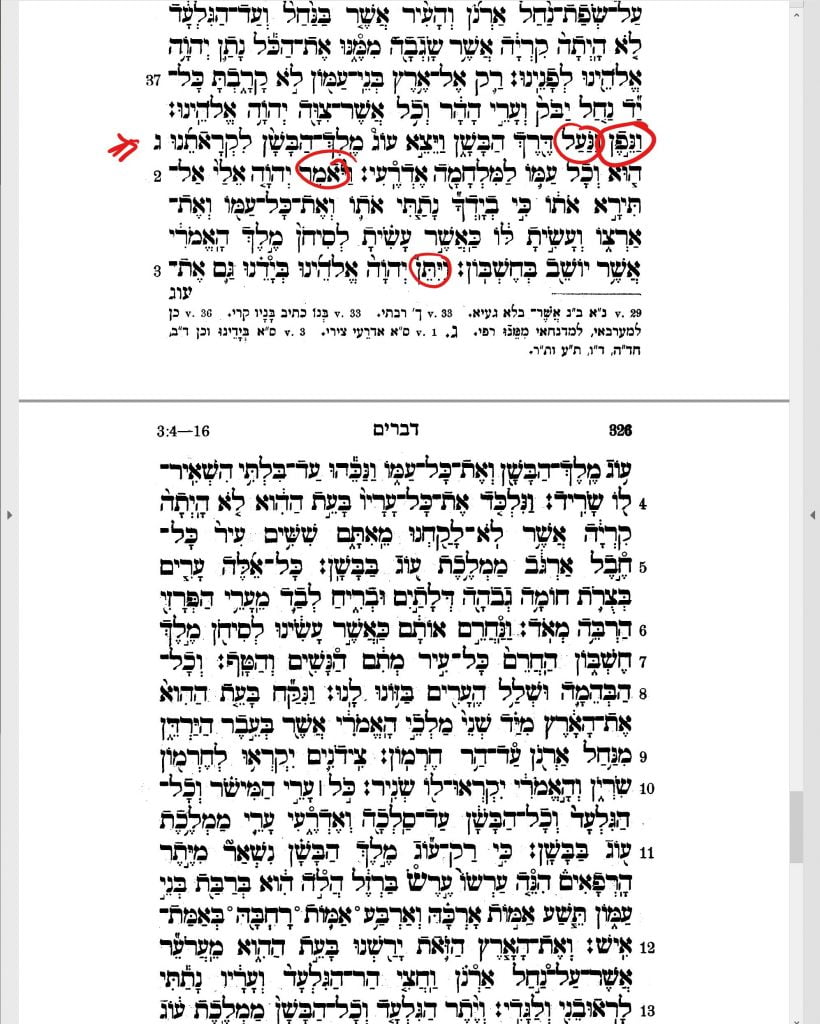
ספר מלכים א פרק ו
א וַיְהִי בִשְׁמוֹנִים שָׁנָה וְאַרְבַּע מֵאוֹת שָׁנָה לְצֵאת בְּנֵי-יִשְֹרָאֵל מֵאֶרֶץ-מִצְרַיִם בַּשָּׁנָה הָרְבִיעִית בְּחֹדֶשׁ זִו הוּא הַחֹדֶשׁ הַשֵּׁנִי לִמְלֹךְ שְׁלֹמֹה עַל-יִשְֹרָאֵל וַיִּבֶן הַבַּיִת לַיהֹוָה: ב וְהַבַּיִת אֲשֶׁר בָּנָה הַמֶּלֶךְ שְׁלֹמֹה לַיהֹוָה שִׁשִּׁים-אַמָּה אָרְכּוֹ וְעֶשְֹרִים רָחְבּוֹ וּשְׁלֹשִׁים אַמָּה קוֹמָתוֹ: ג וְהָאוּלָם עַל-פְּנֵי הֵיכַל הַבַּיִת עֶשְֹרִים אַמָּה אָרְכּוֹ עַל-פְּנֵי רֹחַב הַבָּיִת עֶשֶֹר בָּאַמָּה רָחְבּוֹ עַל-פְּנֵי הַבָּיִת: ד וַיַּעַשֹ לַבָּיִת חַלּוֹנֵי שְׁקֻפִים אֲטֻמִים: ה וַיִּבֶן עַל-קִיר הַבַּיִת יָצִועַ [יָצִיעַ] סָבִיב אֶת-קִירוֹת הַבַּיִת סָבִיב לַהֵיכָל וְלַדְּבִיר וַיַּעַשֹ צְלָעוֹת סָבִיב: ו הַיָּצִועַ [הַיָּצִיעַ] הַתַּחְתֹּנָה חָמֵשׁ בָּאַמָּה רָחְבָּהּ וְהַתִּיכֹנָה שֵׁשׁ בָּאַמָּה רָחְבָּהּ וְהַשְּׁלִישִׁית שֶׁבַע בָּאַמָּה רָחְבָּהּ כִּי מִגְרָעוֹת נָתַן לַבַּיִת סָבִיב חוּצָה לְבִלְתִּי אֲחֹז בְּקִירוֹת הַבָּיִת: ז וְהַבַּיִת בְּהִבָּנֹתוֹ אֶבֶן שְׁלֵמָה מַסָּע נִבְנָה וּמַקָּבוֹת וְהַגַּרְזֶן כָּל-כְּלִי בַרְזֶל לֹא-נִשְׁמַע בַּבַּיִת בְּהִבָּנֹתוֹ:
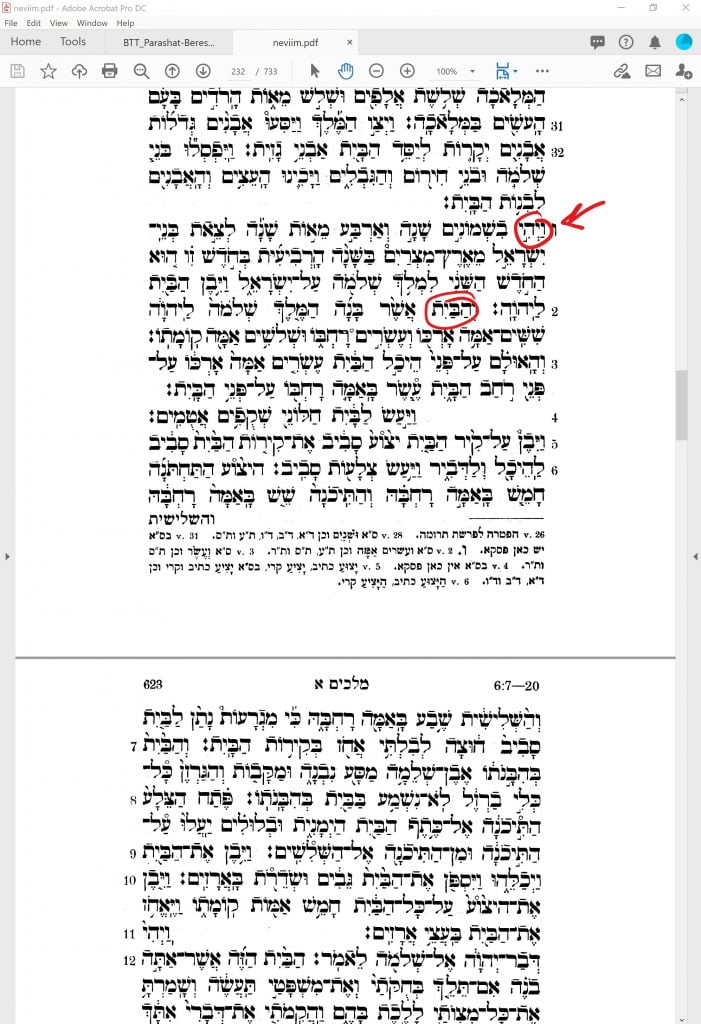
ספר נחמיה פרק ב
א וַיְהִי | בְּחֹדֶשׁ נִיסָן שְׁנַת עֶשְֹרִים לְאַרְתַּחְשַׁסְתְּא הַמֶּלֶךְ יַיִן לְפָנָיו וָאֶשָּׂא אֶת-הַיַּיִן וָאֶתְּנָה לַמֶּלֶךְ וְלֹא-הָיִיתִי רַע לְפָנָיו: ב וַיֹּאמֶר לִי הַמֶּלֶךְ מַדּוּעַ | פָּנֶיךָ רָעִים וְאַתָּה אֵינְךָ חוֹלֶה אֵין זֶה כִּי-אִם רֹעַ לֵב וָאִירָא הַרְבֵּה מְאֹד: ג וָאֹמַר לַמֶּלֶךְ הַמֶּלֶךְ לְעוֹלָם יִחְיֶה מַדּוּעַ לֹא-יֵרְעוּ פָנַי אֲשֶׁר הָעִיר בֵּית-קִבְרוֹת אֲבֹתַי חֲרֵבָה וּשְׁעָרֶיהָ אֻכְּלוּ בָאֵשׁ: ד וַיֹּאמֶר לִי הַמֶּלֶךְ עַל-מַה-זֶּה אַתָּה מְבַקֵּשׁ וָאֶתְפַּלֵּל אֶל-אֱלֹהֵי הַשָּׁמָיִם: ה וָאֹמַר לַמֶּלֶךְ אִם-עַל-הַמֶּלֶךְ טוֹב וְאִם-יִיטַב עַבְדְּךָ לְפָנֶיךָ אֲשֶׁר תִּשְׁלָחֵנִי אֶל-יְהוּדָה אֶל-עִיר קִבְרוֹת אֲבֹתַי וְאֶבְנֶנָּה: ו וַיֹּאמֶר לִי הַמֶּלֶךְ וְהַשֵּׁגַל | יוֹשֶׁבֶת אֶצְלוֹ עַד-מָתַי יִהְיֶה מַהֲלָכְךָ וּמָתַי תָּשׁוּב וַיִּיטַב לִפְנֵי-הַמֶּלֶךְ וַיִּשְׁלָחֵנִי וָאֶתְּנָה לוֹ זְמָן: ז וָאוֹמַר לַמֶּלֶךְ אִם-עַל-הַמֶּלֶךְ טוֹב אִגְּרוֹת יִתְּנוּ-לִי עַל-פַּחֲווֹת עֵבֶר הַנָּהָר אֲשֶׁר יַעֲבִירוּנִי עַד אֲשֶׁר-אָבוֹא אֶל-יְהוּדָה:
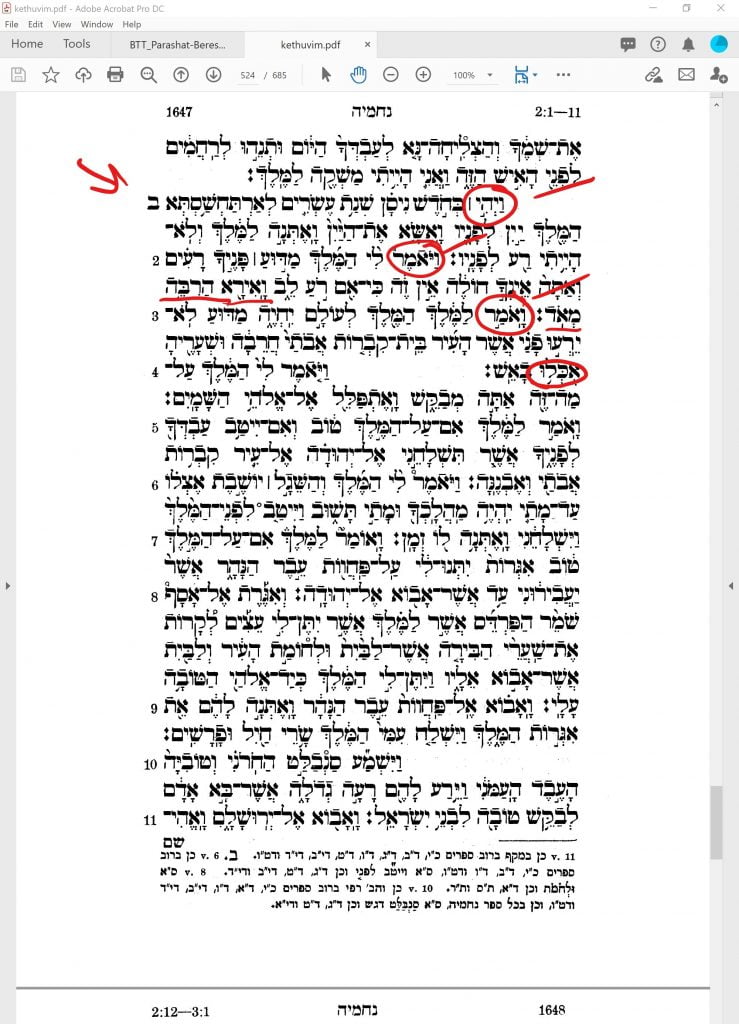
ספר בראשית פרק א
א בְּרֵאשִׁית בָּרָא אֱלֹהִים אֵת הַשָּׁמַיִם וְאֵת הָאָרֶץ: ב וְהָאָרֶץ הָיְתָה תֹהוּ וָבֹהוּ וְחשֶׁךְ עַל-פְּנֵי תְהוֹם וְרוּחַ אֱלֹהִים מְרַחֶפֶת עַל-פְּנֵי הַמָּיִם: ג וַיֹּאמֶר אֱלֹהִים יְהִי-אוֹר וַיְהִי-אוֹר: ד וַיַּרְא אֱלֹהִים אֶת-הָאוֹר כִּי-טוֹב וַיַּבְדֵּל אֱלֹהִים בֵּין הָאוֹר וּבֵין הַחֹשֶׁךְ: ה וַיִּקְרָא אֱלֹהִים | לָאוֹר יוֹם וְלַחֹשֶׁךְ קָרָא לָיְלָה וַיְהִי-עֶרֶב וַיְהִי-בֹקֶר יוֹם אֶחָד: פ ו וַיֹּאמֶר אֱלֹהִים יְהִי רָקִיעַ בְּתוֹךְ הַמָּיִם וִיהִי מַבְדִּיל בֵּין מַיִם לָמָיִם: ז וַיַּעַשֹ אֱלֹהִים אֶת-הָרָקִיעַ וַיַּבְדֵּל בֵּין הַמַּיִם אֲשֶׁר מִתַּחַת לָרָקִיעַ וּבֵין הַמַּיִם אֲשֶׁר מֵעַל לָרָקִיעַ וַיְהִי-כֵן: ח וַיִּקְרָא אֱלֹהִים לָרָקִיעַ שָׁמָיִם וַיְהִי-עֶרֶב וַיְהִי-בֹקֶר יוֹם שֵׁנִי: פ ט וַיֹּאמֶר אֱלֹהִים יִקָּווּ הַמַּיִם מִתַּחַת הַשָּׁמַיִם אֶל-מָקוֹם אֶחָד וְתֵרָאֶה הַיַּבָּשָׁה וַיְהִי-כֵן: י וַיִּקְרָא אֱלֹהִים | לַיַּבָּשָׁה אֶרֶץ וּלְמִקְוֵה הַמַּיִם קָרָא יַמִּים וַיַּרְא אֱלֹהִים כִּי-טוֹב: יא וַיֹּאמֶר אֱלֹהִים תַּדְשֵׁא הָאָרֶץ דֶּשֶׁא עֵשֶֹב מַזְרִיעַ זֶרַע עֵץ פְּרִי עֹשֶֹה פְּרִי לְמִינוֹ אֲשֶׁר זַרְעוֹ-בוֹ עַל-הָאָרֶץ וַיְהִי-כֵן: יב וַתּוֹצֵא הָאָרֶץ דֶּשֶׁא עֵשֶֹב מַזְרִיעַ זֶרַע לְמִינֵהוּ וְעֵץ עֹשֶֹה-פְּרִי אֲשֶׁר זַרְעוֹ-בוֹ לְמִינֵהוּ וַיַּרְא אֱלֹהִים כִּי-טוֹב: יג וַיְהִי-עֶרֶב וַיְהִי-בֹקֶר יוֹם שְׁלִישִׁי: פ יד וַיֹּאמֶר אֱלֹהִים יְהִי מְאֹרֹת בִּרְקִיעַ הַשָּׁמַיִם לְהַבְדִּיל בֵּין הַיּוֹם וּבֵין הַלָּיְלָה וְהָיוּ לְאֹתֹת וּלְמוֹעֲדִים וּלְיָמִים וְשָׁנִים: טו וְהָיוּ לִמְאוֹרֹת בִּרְקִיעַ הַשָּׁמַיִם לְהָאִיר עַל-הָאָרֶץ וַיְהִי-כֵן: טז וַיַּעַשֹ אֱלֹהִים אֶת-שְׁנֵי הַמְּאֹרֹת הַגְּדֹלִים אֶת-הַמָּאוֹר הַגָּדֹל לְמֶמְשֶׁלֶת הַיּוֹם וְאֶת-הַמָּאוֹר הַקָּטֹן לְמֶמְשֶׁלֶת הַלַּיְלָה וְאֵת הַכּוֹכָבִים: יז וַיִּתֵּן אֹתָם אֱלֹהִים בִּרְקִיעַ הַשָּׁמָיִם לְהָאִיר עַל-הָאָרֶץ: יח וְלִמְשֹׁל בַּיּוֹם וּבַלַּיְלָה וּלְהַבְדִּיל בֵּין הָאוֹר וּבֵין הַחשֶׁךְ וַיַּרְא אֱלֹהִים כִּי-טוֹב:
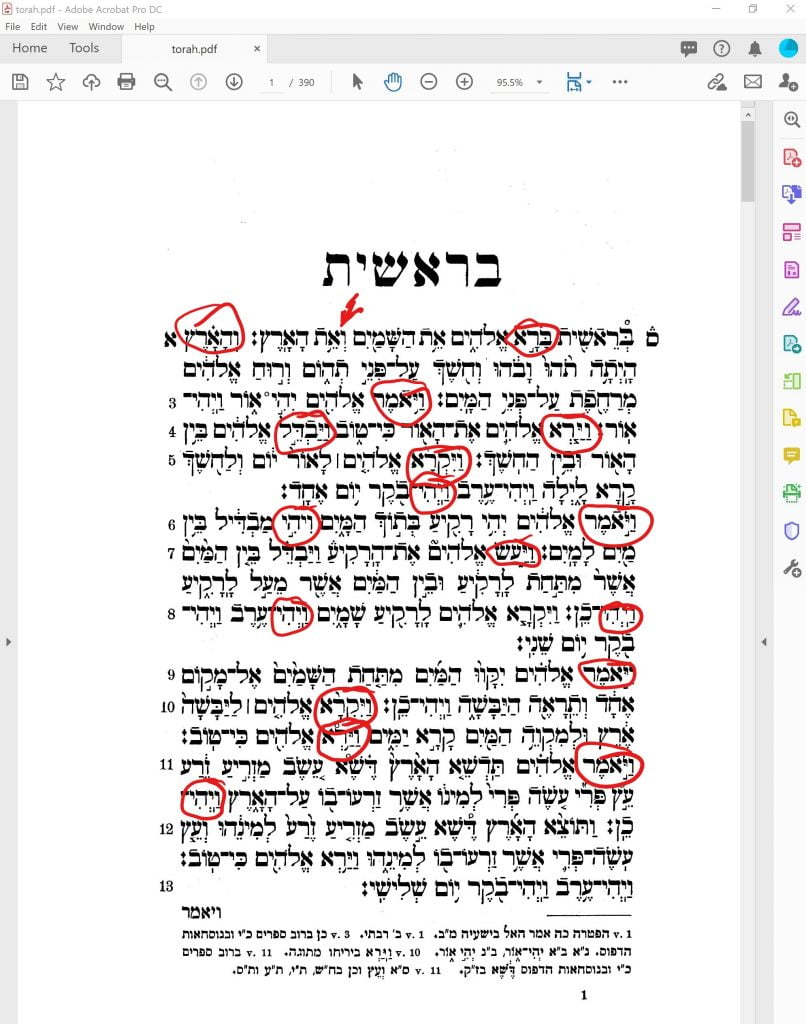
When we examine by actually studying how these texts are related grammatically (via the Vav-Consecutive), it becomes very evident the creation account is written in a historical narrative. This draws out a very important aspect about those who claim Bereshit / Genesis 1 is not real, or is only poetic, or is the way the ancients described evolutionary processes (i.e. day-age (gap) theory, etc). These claims illuminate the lack of faith in the Word and Power of God! The reason this is so significant of a problem in matters of faith is due to something Yeshua said concerning Himself!
John 5:46-47
5:46 ‘For if you believed Moses, you would believe Me, for he wrote about Me. 5:47 ‘But if you do not believe his writings, how will you believe My words?’ (NASB)
Consider the weightiness of Yeshua’s words here in relation to the Torah. Yeshua spoke about the truthfulness of the Torah in relation to who he is, if we do not believe what Moshe wrote, this leads to problems in faith when believing in both what Yeshua said and in who He is (i.e. His purpose of laying down his life for ours). The Scriptures describe how Yeshua came to earth to live a perfect life, being innocent then to die a criminal’s death, and to rise again three days later, all because “God so loved the world” (John 3:16). In addition to this, we are told anyone who believes that Yeshua is Lord and that He was raised from the dead will have “everlasting life” (Romans 10:9). John chapter 5 makes some very significant claims about Yeshua and His purpose! But what does believing in the creation account have to do with believing in Yeshua? These things are related due to our being able to have faith believing God is powerful enough to do these things as His Word states them to be true. The significance of the creation account is connected to having faith in Yeshua’s words according to Bamidbar / Numbers 17.
Bamidbar / Numbers 17:16-24
וַיְדַבֵּ֥ר יְהוָ֖ה אֶל־מֹשֶׁ֥ה לֵּאמֹֽר׃ The LORD spoke to Moses, saying: דַּבֵּ֣ר ׀ אֶל־בְּנֵ֣י יִשְׂרָאֵ֗ל וְקַ֣ח מֵֽאִתָּ֡ם מַטֶּ֣ה מַטֶּה֩ לְבֵ֨ית אָ֜ב מֵאֵ֤ת כָּל־נְשִֽׂיאֵהֶם֙ לְבֵ֣ית אֲבֹתָ֔ם שְׁנֵ֥ים עָשָׂ֖ר מַטּ֑וֹת אִ֣ישׁ אֶת־שְׁמ֔וֹ תִּכְתֹּ֖ב עַל־מַטֵּֽהוּ׃ Speak to the Israelite people and take from them—from the chieftains of their ancestral houses—one staff for each chieftain of an ancestral house: twelve staffs in all. Inscribe each man’s name on his staff, וְאֵת֙ שֵׁ֣ם אַהֲרֹ֔ן תִּכְתֹּ֖ב עַל־מַטֵּ֣ה לֵוִ֑י כִּ֚י מַטֶּ֣ה אֶחָ֔ד לְרֹ֖אשׁ בֵּ֥ית אֲבוֹתָֽם׃ there being one staff for each head of an ancestral house; also inscribe Aaron’s name on the staff of Levi. וְהִנַּחְתָּ֖ם בְּאֹ֣הֶל מוֹעֵ֑ד לִפְנֵי֙ הָֽעֵד֔וּת אֲשֶׁ֛ר אִוָּעֵ֥ד לָכֶ֖ם שָֽׁמָּה׃ Deposit them in the Tent of Meeting before the Pact, where I meet with you. וְהָיָ֗ה הָאִ֛ישׁ אֲשֶׁ֥ר אֶבְחַר־בּ֖וֹ מַטֵּ֣הוּ יִפְרָ֑ח וַהֲשִׁכֹּתִ֣י מֵֽעָלַ֗י אֶת־תְּלֻנּוֹת֙ בְּנֵ֣י יִשְׂרָאֵ֔ל אֲשֶׁ֛ר הֵ֥ם מַלִּינִ֖ם עֲלֵיכֶֽם׃ The staff of the man whom I choose shall sprout, and I will rid Myself of the incessant mutterings of the Israelites against you. וַיְדַבֵּ֨ר מֹשֶׁ֜ה אֶל־בְּנֵ֣י יִשְׂרָאֵ֗ל וַיִּתְּנ֣וּ אֵלָ֣יו ׀ כָּֽל־נְשִֽׂיאֵיהֶ֡ם מַטֶּה֩ לְנָשִׂ֨יא אֶחָ֜ד מַטֶּ֨ה לְנָשִׂ֤יא אֶחָד֙ לְבֵ֣ית אֲבֹתָ֔ם שְׁנֵ֥ים עָשָׂ֖ר מַטּ֑וֹת וּמַטֵּ֥ה אַהֲרֹ֖ן בְּת֥וֹךְ מַטּוֹתָֽם׃ Moses spoke thus to the Israelites. Their chieftains gave him a staff for each chieftain of an ancestral house, twelve staffs in all; among these staffs was that of Aaron. וַיַּנַּ֥ח מֹשֶׁ֛ה אֶת־הַמַּטֹּ֖ת לִפְנֵ֣י יְהוָ֑ה בְּאֹ֖הֶל הָעֵדֻֽת׃ Moses deposited the staffs before the LORD, in the Tent of the Pact. וַיְהִ֣י מִֽמָּחֳרָ֗ת וַיָּבֹ֤א מֹשֶׁה֙ אֶל־אֹ֣הֶל הָעֵד֔וּת וְהִנֵּ֛ה פָּרַ֥ח מַטֵּֽה־אַהֲרֹ֖ן לְבֵ֣ית לֵוִ֑י וַיֹּ֤צֵֽא פֶ֙רַח֙ וַיָּ֣צֵֽץ צִ֔יץ וַיִּגְמֹ֖ל שְׁקֵדִֽים׃ The next day Moses entered the Tent of the Pact, and there the staff of Aaron of the house of Levi had sprouted: it had brought forth sprouts, produced blossoms, and borne almonds. וַיֹּצֵ֨א מֹשֶׁ֤ה אֶת־כָּל־הַמַּטֹּת֙ מִלִּפְנֵ֣י יְהוָ֔ה אֶֽל־כָּל־בְּנֵ֖י יִשְׂרָאֵ֑ל וַיִּרְא֥וּ וַיִּקְח֖וּ אִ֥ישׁ מַטֵּֽהוּ׃ (ס) Moses then brought out all the staffs from before the LORD to all the Israelites; each identified and recovered his staff.(SEFARIA)
Note how Aaron’s staff which was dead, the Lord God caused it to become alive! It also budded, produced leaves, blossomed, and then produced almonds. Notice something here, God brought this stick back to life and caused it to go through three seasons of growth in less than 24 hours. This is the point at which God established the authority of Moshe and Aaron and He used an act of creation to do this! By consequence of Yeshua calling upon the authority of Moshe, and this authority being established here in Bamidbar / Numbers 17, there is a connection to believing in Yeshua by faith and the action of creation of God! In addition, the question that is presented to us in Bamidbar / Numbers 17 is “do we believe what Moshe wrote here in the Torah?” Do you believe Aaron’s staff budding like this is possible? Do you believe God is able to do these things as they are written in the Torah? Note how when believing one part of the Bible is not real, this leads to having to believe other parts of the Bible are also not real (i.e. Bamidbar / Numbers 17) If one believes this is impossible, how could one believe God raised Yeshua from the dead? Wouldn’t bringing a stick back to life be easier than bringing the human body back to life? This is how and why what we believe about the creation account is directly related to our faith in Yeshua as the Messiah of God! We must believe all of God’s Word, and we believe because we have faith in a Powerful Creator God who is faithful (Devarim / Deuteronomy 7:9, 1 Corinthians 1:9, 2 Timothy 2:13, Hebrews 10:23, 11:11, Revelation 3:14).
The conclusion is we either have a Reliable Record in God’s Word or we don’t! We have faith because we believe in God’s Word because the Lord God Almighty Himself claims to be faithful to us and to His covenant. He promised that his Word would never pass away (Isaiah 40:8 and Matthew 24:35). We know the Lord God never fails us (Joshua 21:45). Because of these things, we regard the Word of God, the Scriptures, as reliable, sufficient, and true because the Word has been given to us from God! Moreover, the Lord God of Israel has proven Himself true over and over again according to the Scriptures. His power was demonstrated through the power of His Word creating all that we know! Throughout Scripture we read eye witness accounts of the Lord fulfilling His promises. We also know that operational science (observable, testable, and repeatable experimentation) is consistent with Scripture. Note that evolutionary theory and the tests and experiments involved, are based heavily upon the presupposition that evolution was the only way by which we were created. What we are studying here is how the basis of our faith comes from God, and His Word (Romans 10:17 “Faith comes by hearing, and hearing by the word of God.” NASB) Faith in the RELIABILITY of God’s Word is absolutely important, and necessary for us to believe in Yeshua, who He was, and His purpose of laying His life down for our behalf. Our faith in Yeshua is not based just upon this, but also upon whether the Lord God of Israel has the power to raise Yeshua from the dead to live forever. This connects us to having faith in God’s ability as Creator to bring life to that which was dead (i.e. the creation account). The Word of the Torah, the written Words of Moshe, do we believe what Moshe wrote of the Messiah? Do we believe what He wrote of the creation and the power of God to give life to the dead? The Torah is filled with miracle after miracle, and the question is do we believe these things that are written about God and His power? If we do not, or if we doubt, can we expect that same power to live and work in and through us? It all comes down to faith, and the question of whether we believe God’s Word or not? Do we really believe in Yeshua the Messiah, and in the reliability of God’s Word which speaks of these things?
